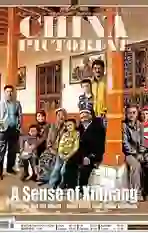Peaceful Aspirations
2014-07-28byYinXing
by+Yin+Xing
Born in Lop County of Hotan Prefecture in southern Xinjiang, Ferhad Memtimin graduated from Beijing University of Chemical Technology after obtaining a masters degree in civil and commercial law. Now a civil servant in Hotan, 28-year-old Ferhad is one of the eleven coauthors of the preceding letter after the terrorist attack at Urumqi South Railway Station. China Pictorial interviewed him by phone.
China Pictorial: Why did you write such an article after the terrorist attack at Urumqi South Railway Station?
Ferhad Memtimin: Upon hearing the news about the terrorist attack, I felt very sad and angry as did my family and friends. We hope this letter can inspire our Uygur people to stand up to condemn the terrorists as well as join the whole nation in fighting against them. At the same time, from bottom of our hearts, we hope the attacks dont lead to misunderstandings between various ethnic groups and breaks in ethnic unity. So, we decided to write the letter.
CP: The terrorists attributed the murder of innocent people to conflicts between Han and Uygur people. Do you think this is accurate? Why did they do this?
Ferhad: Terrorists cannot represent anybody or any ethnic group. Terrorism is neither an ethnic nor a religious issue. Deluded by extremist religious ideologies and roused by overseas hostile influences, the terrorists are trying to undermine ethnic and national unity under the guise of pursuing religious freedom and ethnic independence. They not only brutally take lives of those from other ethnic groups but also humiliate the Uygur people, bringing disaster to everyone. They are enemies of all humans regardless of nationality.
CP: Now you are employed as a civil servant in Sampul Village in Lop County, a position that affords personal contact with local people. What are the biggest difficulties in your work?
Ferhad: Due to its geographical location, southern Xinjiang is isolated, which limits its economic development. Local people are mainly peasants and herders with minimal education. The less they know about the outside world, the more reluctant they are to accept other cultures. Local Uygur people hardly know any Mandarin. Some staffers of the local government are Han people. Conversely, they do not know the Uygur language. Communication is difficult, which hinders mutual understanding of contrast- ing ethnic cultures and customs. So, we are encouraging Uygur people to learn Mandarin and Han people to learn Uygur. Only communication will bring mutual understanding and respect.
CP: As for Mandarin, you can speak very fluently. When did you start learning Mandarin?
Ferhad: When I was young, I had many Han neighbors. We played together, so as a child, I was already picking up some conversational Chinese. Because education in southern Xinjiang is lacking, since 2000, the Chinese government has been attempting to provide more educational opportunities for Xinjiang children. The government began offering excellent Xinjiang students enrollment at high schools outside the region. That year, 1,000 students were selected. I was one of them. I finished high school in Qingdao City, Shandong Province, and received my bachelors and masters degrees in Beijing universities. Over those 13 years, I learned much more than just Mandarin. I know that the government-sponsored program is continuing and that tens of thousands of students just like me have reaped the same benefits. Some universities also provide special scholarships and greater quotas for Xinjiang minorities. I really hope more Xinjiang young people can travel outside their remote hometowns to see the rest of the world.
CP: You studied in Qingdao and Beijing, where the majority of residents are Han people. Do you have Han friends?
Ferhad: Of course! I have many friends who are Han, not only from within the country, but even abroad. Ive made many friends from a wide range of ethnic groups. We are buddies. When I first arrived in Qingdao for high school along with other Xinjiang students, we had a hard time adapting to the areas lifestyle, especially the food. At that time, our teachers and classmates helped us a lot. Still today, when I recall their kindness, I feel moved. At college, during Islamic festivals like Corban and Id al-fitr, our school would sponsor the celebrations.
CP: Given security concerns, many people are now afraid of visiting Xinjiang. If you have the chance to introduce your homeland of Xinjiang, what would you want to say?
Ferhad: Xinjiang is a good place. Xinjiang people are peaceloving and Uygur people are kindhearted. Islam is a peaceful religion. Xinjiang people, like others around the world, aspire for peaceful and good lives.
